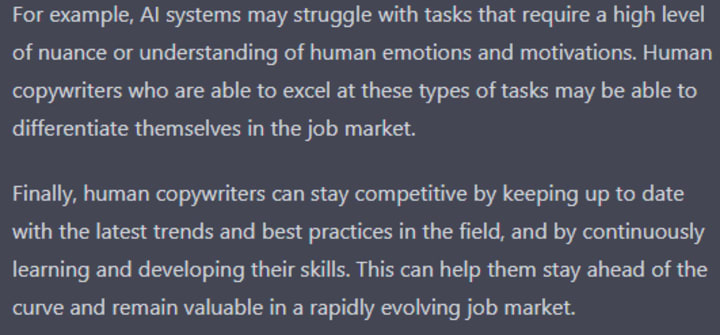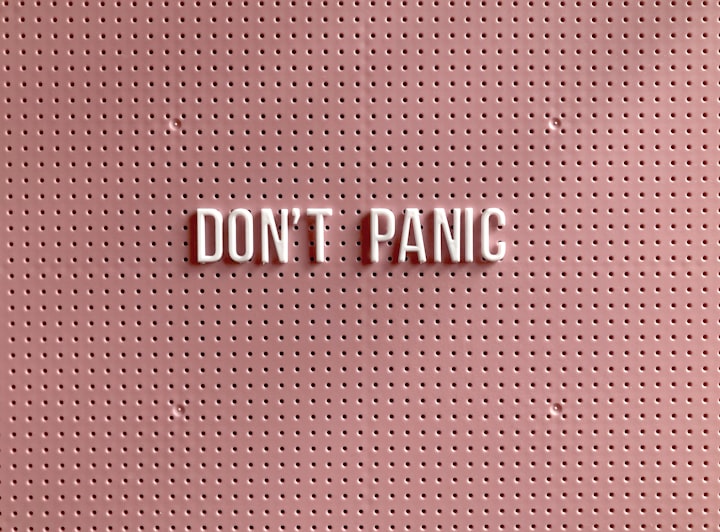Artificial Intelligence Meets Creation
Confused and Scared By AI’s Impact on Content Creation? Yo, same.
I don’t care about your grandma, just give me my recipe.
Content creation isn't the most straightforward job in the world. As well as the more technical aspects, such as SEO and staying up-to-date on trends, techniques, and topics, we’re supposed to provide engaging and enriching content that our target audience feels excited by and ready to engage with…
Unfortunately, the world is full of people who are over-stimulated by the hyper-saturation of content vying for their attention and many find themselves easily bored or even frustrated by content that feels like it's wasting their time. I can say this because I’m one of them.
Like, god forbid I’m trying to google a recipe and it starts with a 600-word story about the history of the recipe and how it was passed down from the author’s great-grandmother.
As someone with a limited attention span and no patience when it comes to a google search, I want that recipe to be about 400 words shorter.
On the other hand, if I were writing that recipe for a family-owned meal-planning company, including that story about grandma would feel important to capturing the brand voice and adding a level of authenticity that I often feel the world is sorely lacking.
AI’s got your authenticity for you, right here.

If you’re picturing a rude hand gesture with that sub-header, you read the tone correctly.
As google adjusts its algorithm to promote content that is more “helpful”, and as AI pushes itself further and further into the realm of art and creation...a lot of writers are sort of...shall we say...freaking out?
Myself included.
And yet...AI doesn't need authenticity. AI just does what it's told - and if more people click on the recipe that says "Screw grandma, here's the recipe nerds!" then, just as Google’s AI would continue promoting that content, an AI bot told to write “a high-performing Jumbalya recipe” would put out something like “Forget grandma! Here’s a good jambalaya recipe:”
The rational part of my brain tells me that Artificial Intelligence is just a computer program. A series of "if x then y" protocols. Utilizing tools like Chatbot MidJourney is simply providing input requests and setting precise parameters.
And yet…
Are the robots gonna steal our jobs, mommy?

"WhAt IF tHe RoBotS aRE GonNA StEAl mY JoBB?!?!"
- Literally me two days ago.
But, our current AI programs aren't exactly terminator. Alexa, customer service chatbots, medical image analysis, financial analysis, fraud detection, manufacturing, and transportation are all industries that have benefited from the inclusion of artificial intelligence.
And, yeah, people were displaced from their jobs.
Here is an incredibly uncomfortable fact that we’ll have to embrace as a society: technological revolutions result in occupational displacements.
I'm not saying I like this or believe it's a good thing, and I’m certainly not suggesting that we should ignore the problem. As a matter of fact, that’s why I’m bringing attention to it.
Every time someone comes up with a way to automate a process, they are removing the need for a human being to be a part of that process. Of course, there will be those whose jobs become to oversee and maintain the machines that have automated those processes...but most creative types aren't particularly interested in that kind of work. (There’s a good reason I didn’t major in computer science despite being fascinated with this stuff.)
Just asked the robot. It had some thoughts.
"How can content creators and copywriters compete with AI copy?"

Its answer amounted to this:
1. Am Robot, not very creative. You human, very creative.
2. Am Robot, don't have feelings. You human, have many feelings.
3. Stay up to date on marketing techniques.
So, the algorithm raked through a couple of hundred articles on the subject and that’s what it came up with. Articles like this one: written by someone smarter than me.
But even in my own experimentation with a text-generating chatbot, I found similar results:
- Inaccurate information
- Referencing an article that disproves the point I was asking it to make
- Boring repetitive copy and content that lacked any real tone or personality
- Great at generating lists
So what does all this mean for the future of content creation?
Asking me what I think about AI is like asking me what I think about a hammer. It’s a tool. A new and powerful tool that optimists will see as something to make the world a better place, and pessimists will see as something that will no doubt seal the coffin of mankind’s doom.
I like to think of myself as a realist. I think whether we like it or not, the cat is out of the bag. I think AI has already impacted several industries, and a lot of Marketing companies are already utilizing it as part of their content creation. Having a robot generate additional topics to supplement your lists is great.
Tools aren’t inherently evil. We decide what to do with them, and what the rules are. For example, we’ve collectively agreed as a society that it’s generally considered bad form to use a hammer to smash someone’s head in (no matter how smug they are about beating you at Mario Kart).
This is the bit when I actually tell you my opinion.

Oh wow, you stuck around this long, eh? Did you jump down here because you actually cared about my opinion or did you actually read through this whole rambling mess? Either way, here are L.E. King’s suggestions for rules to implement as we move forward with the creative use of AI.
Ethical sourcing: Plagiarism is bad folks. If you’re training AI and someone’s writing and then emulating that style to make money then that person should be getting paid.
Research: If AIs are being used to generate written text and facts, then those should probably be accurate, yes? AI shouldn’t be telling me about how Richard Harris is going to reprise his role as Albus Dumbledore in the upcoming Hogwarts Legacy video game.
Tone policing? Should AI be restricted to only producing positive content? No sass, no sarcasm - only straight dry, and boring facts from you Mr. Computer.
Asimov’s laws of Robotics: never forget.
Ok, I’m like done now. If you read this whole piece and enjoyed it, take some time to like it and comment. It really helps! If there's a topic in the realm of video games, marketing, art, or science you'd like me to cover - let me know!
(And if you really liked it, you can always donate - it's a great form of encouragement.)
About the Creator
L. E. King
I am a writer, actress and artist. I am the exhausted and overused kettle that is screeching on a stove top because I've hit boiling. I am almost 30 and living out my 10th existential crisis. I think I'm funny, and that's all that matters.







Comments (1)
Well written article. I think AI will help writers write. I also think AI will only eliminate writing jobs that writers don't want in the first place. People connect with authors, not robots.